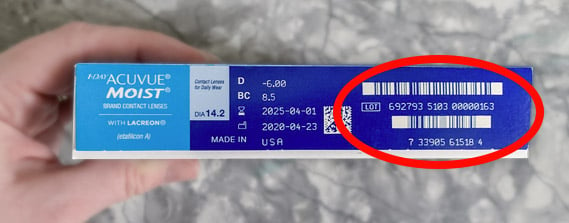Why Is My Vision Blurry With Contacts?
Contact lenses should be providing you with clear and corrected vision, not making your vision cloudy. If your vision is blurry with contacts in, something’s not right. There are various reasons why this could be happening, and it’s important to pinpoint the problem before it worsens.

Causes of Blurred Vision with Contacts
Dryness
A dry eye or contact lens can cause hazy vision. If you experience clearer vision directly after blinking or putting in rewetting drops, then dry eyes or contacts is most likely your issue. Having dry eyes does not necessarily mean you need to avoid contacts. Certain contact lenses are better for dry eyes. Lens features such as high oxygen permeability, low water content, and more can affect
contact-lens induced dry eye (CLIDE). There are also different
types of eye drops that are better for dry eyes. Avoid sleeping in your contacts or wearing them longer than prescribed since this will also result in dryness.
Debris
Deposits and debris can stick to the surface of contact lenses and interfere with you seeing clearly. You may not be
cleaning your contacts properly or wearing them for longer than prescribed, causing the deposits to build up. In this case, you should compare your vision with glasses versus contacts to see if the cloudiness goes away. If it does, then this is most likely the problem. Rinse or clean your contacts with the correct
solution or put in a new pair if you use daily disposables.
Lens Rotation
The fit of your contact lens is important. If the lens is moving around on your eye and not centered, your vision will be affected. Those with astigmatism will experience blurry vision from any lens movement since
toric contact lenses have a particular orientation. If this is a recurring problem, your doctor may need to perform another
contact lens fitting.
Vision Changes
Subtle vision changes can occur, especially in growing children and teenagers or adults over 40, that can cause blurry vision. Talk to your eye doctor since you might need to update your prescription.
Health Issues
An underlying medical condition could be the reason for your hazy vision.
Eye problems such as cataracts and glaucoma will cloud your vision. Eye infections such as conjunctivitis, or pink eye, can also irritate your eye and cause the blur. If the cloudiness persists even after changing or removing your contacts, you should visit your eye doctor immediately.
Blurry vision is normal, but not while wearing your contacts. Always talk to your eye care professional if you experience cloudy vision with contact lenses.


